The omens were so good. Stephen Page’s 32 year reign at Bangarra was coming to a massive climax with the largest show the company had ever attempted. After so many years in which he’d mined the traditional stories, songs and dances of the remote Indigenous North, Page was finally ‘going home’ to his father’s Yugambeh Country south of Brisbane. His late father had often complained that his boy was ignoring his own people. And now, in several statements, Page was recognising that the Southern Mob generally were all beginning to find their way back home in terms of re-discovering language, mythology and ceremony.
And to achieve what he summed up in a lengthy speech before the opening performance last night as “an operatic, ceremonial contemporary story”, Page was calling on 17 dancers, five actors and four musicians live on stage. The Sydney Theatre Company was brought in for some unspecified production role. Stephen’s family played vital parts – sister Donna lead the way into the Mibinyah poetry of the Yugambeh language; and his late composer brother, David had left behind music to accompany that. Playwright Alana Valentine came back for another stint as dramaturg. The music required composition by Bangarra regular Steve Francis, plus direction from Alan John and violinist Veronique Serret – not to mention Wiradjuri/Gamilaroi guitarist and composer Brendan Boney. And the semi-retired, 22-year veteran dance star of the company, Elma Kris was back on stage to take the title role of Wudjang – an ancestral grandmother figure who rises creakingly from the bones that are discovered during a dam-building operation to “dance of history, the earth, the songlines” and teach the current Yugambeh generation.
What could go wrong?
Sadly, a complex story-line that reads quite clearly in the program, just didn’t come across as clearly on stage. Part of the problem was wondering much of the time who was telling the story. Was it, as one expects with Bangarra, the fabulous dancers, going through some magnificent examples of Page’s choreography? Was it in the songs – some in language, some hitting bluesy intensity, one sounding surprisingly like ‘House of the Rising Sun’, yet others having absolutely First Nations roots? Or was it in the strong presence of actors – the one whitefellar Justin Smith playing all the baddies; Stephen’s cousin Kirk Page as contemporary Yugambeh man Bilin – but also a historical figure; the larger-than-life Elaine Crombie, relishing the prospect of revenge on all those historical rapes of Indigenous women; or Jess Hitchcock as a know-it-all contemporary girl, definitely in need of Wudjang’s wisdom???
There were many in the audience that clearly didn’t care about my concerns for this multi-faceted presentation, simply enjoying a stage filled with dramatic sounds and action. A standing ovation – pretty much a tradition at Bangarra’s opening nights – was almost universal. So, did I fail to appreciate a post-Modern multiplicity of stories? Or could it be that in the face of all those talented creator voices, a single through-line failed to emerge?
And what remains this morning? Undoubtedly Jacob Nash’s set was visually powerful – a vast tunnel-digging wheel hanging menacingly over everything, a symbol of the colonial depredation of Yugambeh Country. Elma Kris’s constant presence was a still centre in all of the action – dark, ancient and quiet, exuding wisdom. The tragedy of the Nerang River massacre was deeply played out by the victims, and matched by a dance of traumatised tribal women. Light relief came through the dangerous idea of turning dancers into a mob of sheep – their spring-loaded leaps encouraging Bilin to enter into conversation with them. And Brendan Boney’s fine guitar on what stood out as a truely Aboriginal blues number. Did he compose it as well, I wonder?
‘Wudjang : Not the Past’ moves to Hobart in February and the Adelaide Festival in March. (to 12/2)
BTW, in the light of my recent adumbrations on the subject of the Sydney Festival boycott and the Indigenous, there appears to have been no consideration of it by Bangarra.




I was moved by it all. Yes, at first I was confused, I came to enjoy the unique dance style of Bangarra. The darkness of the performance really hit me, Drew tears & set my body trembling. I didn’t know if I could stay but glad I did. Yes, the sheep but when the voices of Elaine Crombie & Jess Hitchcock cane together it was ethereal. My god those women can sing. Looking forward to sharing the performance in Adelaide. There is so much, the live music, the dancers, the singers, the staging. Buy the program & read it before the performance commences & then be overawed.